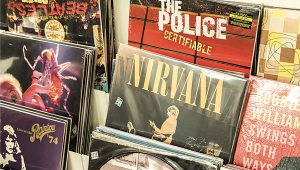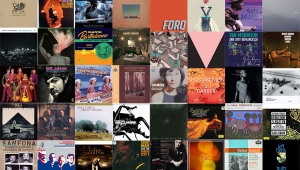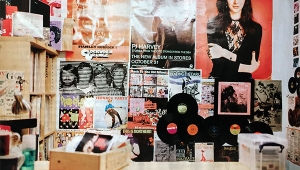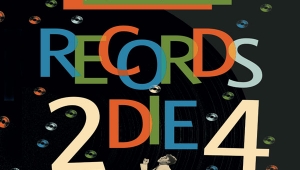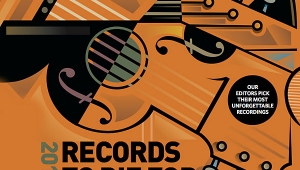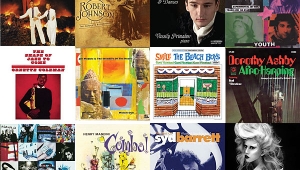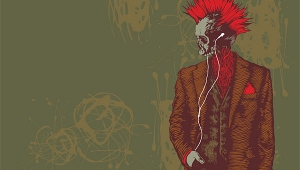| Columns Retired Columns & Blogs |
1997 Records To Die For Page 12
Chip Stern
DUKE ELLINGTON: Duke Ellington and his Famous Orchestra, Fargo, North Dakota, November 7, 1940
Duke Ellington, piano, arranger; Rex Stewart, cornet; Wallace Jones, Ray Nance, trumpets; Joe "Tricky Sam" Nanton, Juan Tizol, Lawrence Brown, trombones; Barney Bigard, clarinet; Johnny Hodges, alto sax; Otto "Toby" Hardwick, clarinet, alto sax; Ben Webster, tenor sax; Harry Carney, baritone sax; Freddie Guy, guitar; Jimmy Blanton, bass; Sonny Greer, drums; Ivie Anderson, Herb Jeffries, vocals
VJC-1019/20-2 (2 CDs only). 1940/1991 Jack Towers, eng. AAD TT: 2:34:38
Hey, while we're waiting on 24-bit digital, anyone for direct-to-disc? Out of a series of anonymous one-nighters by the Ellington band in fall 1940, recording engineer Jack Towers found himself in Fargo, North Dakota one fine evening with a disc-cutting machine. Decades later, Towers himself remastered it all down to 21/2 hours' worth of material, and the results are of historic import for jazzbos and audiophiles alike. With the possible exception of Ellington's mid-'50s juggernaut, this was the composer's finest ensemble---one of the greatest orchestras in the history of American music playing some of their leader's most notable arrangements. When the PA bites, the leader's piano and the vocals can disappear into the murk, and of course there's surface noise, but Towers has not only rendered the sound of hard-to-record instruments such as the drums and acoustic bass with uncommon clarity and dynamics, he's captured their overall balance with the brass and reeds. This is a remarkable example of how the band and their most celebrated soloists actually sounded 50 years ago, and you are there.
BÉLA BARTÓK: Concerto for Orchestra, Music For Strings, Percussion and Celesta
Fritz Reiner, Chicago Symphony
RCA Red Seal 5604-2-RC (CD only). 1955. Richard Mohr, prod.; Lewis Layton, eng. ADD. TT: 65:07
I was a little boy when Reiner's classic recording of Bartók's Concerto for Orchestra was first released in 1955, and I was captivated by its dark lyricism, startling dynamics, and relentless rhythmic thrust. Some four decades later, the Chicago Symphony's performance of this seminal 20th-century work remains the standard by which all other recordings must be judged. As a timpanist, Reiner brought a unique perspective to the work of his Hungarian contemporary, and a subtle rhythmic thread wends its way through the dramatic contrasts of the first movement, the spare martial mystery of the second, the somber gravity of the third, the folkish airs and cheeky parodies of the fourth, and the exultant, dancelike exchanges of the finale. Bartók treats the orchestra like a giant polyrhythmic, polymorphous percussion instrument (much as Debussy did with La Mer), and Reiner recognizes this as few contemporary conductors do. (Bartók deals even more explicitly with this type of rhythmic treatment in Music for Strings, Percussion and Celesta). This early stereo recording offers a very dreamy perspective, with stylized room ambience, pronounced channel separation, rich, silky strings, and warm, biting brass---all of which add to the mystery of the music and beckon the listener to become more involved. (XVIII-2, 6)

Zan Stewart
SONNY ROLLINS: Saxophone Colossus
Prestige OJCCD-291-2 (CD). 1956/1987. Bob Weinstock, original session prod.; Rudy Van Gelder, engineer. TT: 39:58
Rollins walked into a New York studio in June, 1956 and created---despite his later feelings to the contrary---musical perfection. Two jazz classics are debuted: the irresistibly undulating calypso "St. Thomas," where the tenor saxophonist banters gleefully with drummer Max Roach, and the eloquent slow drag, "Blue Seven." The standards are, likewise, wondrous. "Moritat," or "Mack the Knife" to most of us, has undeniable sizzle and pop, while the three tempos of "You Don't Know What Love Is" present Rollins as Picasso-ish cubist, examining his vehicle from every angle. Throughout, his sound is brilliantly gruff.
CHARLIE PARKER: Confirmation: The Best of the Verve Years
Verve 314 527 815-2 (CD only). 1996. Norman Granz, original prod.; reissue prod., Michael Lang; original engineers, unlisted; Gary N. Mayo, remastering engr. 2 CDs, TT: 2:13:05
This is splendor for your ears, heart, and mind. Collected are many of Bird's grandest goodies made between 1947 and 1953 for such labels as Mercury, Clef, and Verve. For sheer bebop wizardry---that rush of tempo that can cause shivers---there's "Kim," and "She Rote." For three-hanky, catch-your-breath balladry, there's "Embraceable You" or "Lover Man," the altoist's gleaming sound singing every note. Parker's ever-astonishing melodic grace lights up "Just Friends" and "The Song is You." Finally, there's the bebop anthem "Confirmation," with its twist-turns and plain feel-good attitude where Bird's lines flow with characteristic ebullience. Timeless stuff, all.

Steven Stone
TULARE DUST: A Songwriters' Tribute to Merle Haggard
Hightone HCD-8058 (CD only). 1994. Tom Russell, Dave Alvin, prods. AAD? TT: 50:45
It's so darned hard to winnow down all the great releases on my shelves to two worthy for inclusion in this year's "Records To Die For." An anthology like Tulare Dust makes the selection process a trifle easier since it includes so many fine performances by exceptional artists. Initiated by producers Tom Russell and Dave Alvin, this project features a collection of "roots performers" doing their favorite Merle Haggard songs. There isn't a bad cut on the disc. My favorites are Iris DeMent's rendition of "Big City," Joe Ely's "White Line Fever," Billy Joe Shaver's "Ramblin Fever," and Katy Moffat's "I Can't Be Myself." Russell's and Alvin's contributions bookend the disc.
HOMER & JETHRO: Songs My Mother Never Sang
RCA LSP-2286 (LP, nla). Chet Atkins, prod.; Bill Porter, eng. AAA. TT: Long enough to die laughing.
To most people, Homer and Jethro were merely country clowns. In fact, they were musical gods, and one listen to Songs My Mother Never Sang should convince you. Both of them were great swing players---almost any Jethro Burns mandolin solo ("Will you Love Me?" is a peach) is the equal of work by Django Reinhardt, Les Paul, or Charlie Christian. (In 1977 Flying Fish released Jethro Burns (FF-042), a superb LP of jazz instrumentals.) Homer (née Henry) Hayes was a fine singer and a quite respectable guitarist---just listen to his intro comping on "Tattooed Lady." Before-song banter and occasional screwups are included gratis---the beginning of "I Love Your Pizza" includes backup singers laughing so hard they can't sing (one even says to herself, "think of something sad..."). Produced by Chet Atkins, who also plays guitar fills and an occasional solo ("Will You Love Me?"), and engineered by the legendary Bill Porter, this disc sounds as good as anything that ever came out of RCA's Nashville studios. In other words, it's a killer. Vocals are natural, the soundstage is immense, and the string bass blooms like a string bass should. If you're stuck on a desert island, this disc will certainly make a nice sun-hat-er, make you laugh out loud.

DUKE ELLINGTON: Duke Ellington and his Famous Orchestra, Fargo, North Dakota, November 7, 1940
Duke Ellington, piano, arranger; Rex Stewart, cornet; Wallace Jones, Ray Nance, trumpets; Joe "Tricky Sam" Nanton, Juan Tizol, Lawrence Brown, trombones; Barney Bigard, clarinet; Johnny Hodges, alto sax; Otto "Toby" Hardwick, clarinet, alto sax; Ben Webster, tenor sax; Harry Carney, baritone sax; Freddie Guy, guitar; Jimmy Blanton, bass; Sonny Greer, drums; Ivie Anderson, Herb Jeffries, vocals
VJC-1019/20-2 (2 CDs only). 1940/1991 Jack Towers, eng. AAD TT: 2:34:38
Hey, while we're waiting on 24-bit digital, anyone for direct-to-disc? Out of a series of anonymous one-nighters by the Ellington band in fall 1940, recording engineer Jack Towers found himself in Fargo, North Dakota one fine evening with a disc-cutting machine. Decades later, Towers himself remastered it all down to 21/2 hours' worth of material, and the results are of historic import for jazzbos and audiophiles alike. With the possible exception of Ellington's mid-'50s juggernaut, this was the composer's finest ensemble---one of the greatest orchestras in the history of American music playing some of their leader's most notable arrangements. When the PA bites, the leader's piano and the vocals can disappear into the murk, and of course there's surface noise, but Towers has not only rendered the sound of hard-to-record instruments such as the drums and acoustic bass with uncommon clarity and dynamics, he's captured their overall balance with the brass and reeds. This is a remarkable example of how the band and their most celebrated soloists actually sounded 50 years ago, and you are there.
BÉLA BARTÓK: Concerto for Orchestra, Music For Strings, Percussion and Celesta
Fritz Reiner, Chicago Symphony
RCA Red Seal 5604-2-RC (CD only). 1955. Richard Mohr, prod.; Lewis Layton, eng. ADD. TT: 65:07
I was a little boy when Reiner's classic recording of Bartók's Concerto for Orchestra was first released in 1955, and I was captivated by its dark lyricism, startling dynamics, and relentless rhythmic thrust. Some four decades later, the Chicago Symphony's performance of this seminal 20th-century work remains the standard by which all other recordings must be judged. As a timpanist, Reiner brought a unique perspective to the work of his Hungarian contemporary, and a subtle rhythmic thread wends its way through the dramatic contrasts of the first movement, the spare martial mystery of the second, the somber gravity of the third, the folkish airs and cheeky parodies of the fourth, and the exultant, dancelike exchanges of the finale. Bartók treats the orchestra like a giant polyrhythmic, polymorphous percussion instrument (much as Debussy did with La Mer), and Reiner recognizes this as few contemporary conductors do. (Bartók deals even more explicitly with this type of rhythmic treatment in Music for Strings, Percussion and Celesta). This early stereo recording offers a very dreamy perspective, with stylized room ambience, pronounced channel separation, rich, silky strings, and warm, biting brass---all of which add to the mystery of the music and beckon the listener to become more involved. (XVIII-2, 6)
Zan Stewart
SONNY ROLLINS: Saxophone Colossus
Prestige OJCCD-291-2 (CD). 1956/1987. Bob Weinstock, original session prod.; Rudy Van Gelder, engineer. TT: 39:58
Rollins walked into a New York studio in June, 1956 and created---despite his later feelings to the contrary---musical perfection. Two jazz classics are debuted: the irresistibly undulating calypso "St. Thomas," where the tenor saxophonist banters gleefully with drummer Max Roach, and the eloquent slow drag, "Blue Seven." The standards are, likewise, wondrous. "Moritat," or "Mack the Knife" to most of us, has undeniable sizzle and pop, while the three tempos of "You Don't Know What Love Is" present Rollins as Picasso-ish cubist, examining his vehicle from every angle. Throughout, his sound is brilliantly gruff.
CHARLIE PARKER: Confirmation: The Best of the Verve Years
Verve 314 527 815-2 (CD only). 1996. Norman Granz, original prod.; reissue prod., Michael Lang; original engineers, unlisted; Gary N. Mayo, remastering engr. 2 CDs, TT: 2:13:05
This is splendor for your ears, heart, and mind. Collected are many of Bird's grandest goodies made between 1947 and 1953 for such labels as Mercury, Clef, and Verve. For sheer bebop wizardry---that rush of tempo that can cause shivers---there's "Kim," and "She Rote." For three-hanky, catch-your-breath balladry, there's "Embraceable You" or "Lover Man," the altoist's gleaming sound singing every note. Parker's ever-astonishing melodic grace lights up "Just Friends" and "The Song is You." Finally, there's the bebop anthem "Confirmation," with its twist-turns and plain feel-good attitude where Bird's lines flow with characteristic ebullience. Timeless stuff, all.
Steven Stone
TULARE DUST: A Songwriters' Tribute to Merle Haggard
Hightone HCD-8058 (CD only). 1994. Tom Russell, Dave Alvin, prods. AAD? TT: 50:45
It's so darned hard to winnow down all the great releases on my shelves to two worthy for inclusion in this year's "Records To Die For." An anthology like Tulare Dust makes the selection process a trifle easier since it includes so many fine performances by exceptional artists. Initiated by producers Tom Russell and Dave Alvin, this project features a collection of "roots performers" doing their favorite Merle Haggard songs. There isn't a bad cut on the disc. My favorites are Iris DeMent's rendition of "Big City," Joe Ely's "White Line Fever," Billy Joe Shaver's "Ramblin Fever," and Katy Moffat's "I Can't Be Myself." Russell's and Alvin's contributions bookend the disc.
As befits an R2D4, the sound is excellent. Despite using a slew of studios and engineers, all the selections share clean, clear, natural sonics. Everything from Eddie Shaver's raucous Stratocaster solo to Greg Leisz's spooky electric water guitar are captured with superb fidelity and accuracy. If you only own one anthology of Merle Haggard songs, this is the one to have.
HOMER & JETHRO: Songs My Mother Never Sang
RCA LSP-2286 (LP, nla). Chet Atkins, prod.; Bill Porter, eng. AAA. TT: Long enough to die laughing.
To most people, Homer and Jethro were merely country clowns. In fact, they were musical gods, and one listen to Songs My Mother Never Sang should convince you. Both of them were great swing players---almost any Jethro Burns mandolin solo ("Will you Love Me?" is a peach) is the equal of work by Django Reinhardt, Les Paul, or Charlie Christian. (In 1977 Flying Fish released Jethro Burns (FF-042), a superb LP of jazz instrumentals.) Homer (née Henry) Hayes was a fine singer and a quite respectable guitarist---just listen to his intro comping on "Tattooed Lady." Before-song banter and occasional screwups are included gratis---the beginning of "I Love Your Pizza" includes backup singers laughing so hard they can't sing (one even says to herself, "think of something sad..."). Produced by Chet Atkins, who also plays guitar fills and an occasional solo ("Will You Love Me?"), and engineered by the legendary Bill Porter, this disc sounds as good as anything that ever came out of RCA's Nashville studios. In other words, it's a killer. Vocals are natural, the soundstage is immense, and the string bass blooms like a string bass should. If you're stuck on a desert island, this disc will certainly make a nice sun-hat-er, make you laugh out loud.
- Log in or register to post comments



